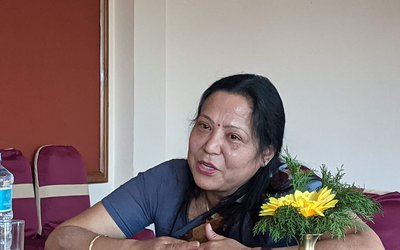Three sons of Krishna Prasad Koirala became prime ministers of Nepal. The family of KEDAR NATH UPADHYAY, former Chief Justice and the chairman of the National Human Rights Commission of Nepal, has similarly contributed in the modernization of judicial system in Nepal. His elder brother Bishwonath Upadhyay, who drafted the Constitution of Kingdom of Nepal 1990, served as the chief justice of Nepal’s Supreme Court from 1991 to 1996. Upadhyay’s another brother Bidhyanath Upadhyay is now the justice of Supreme Court. Born in Jaleshwor, Mahottari District, Nepal on Feb 1939, Upadhyay obtained his basic degree from Patna University, India. He acquired his second degree in Law from Tribhuvan University, Nepal. Besides, he completed a comprehensive course in Public International Law (including Humanitarian Laws and Human Rights Jurisprudence). He is also a diploma holder in Air and Space Law from the Institute of World Affairs, London (U. K.). Upadhyay was appointed in the present post on September 18, 2007. He has a long career in judiciary which includes twelve years in the Supreme Court of Nepal. He retired in 2004 after having served as a Chief Justice of the Supreme Court for a period of fourteen months. Apart from being the former Chief Justice and the present chairman of the NHRC, he has occupied several important positions in the past. He has served as a judge in various Regional and Zonal courts, Senior Government Advocate in the office of the Attorney General and Under Secretary in the Ministry of Law and Justice, Chairman of Administrative Court, member of Royal Commission on Judicial Reform and the director in the Board of Directors of Rastriya Banijya Bank. Chairman of National Human Rights Commission Upadhyay spoke to SHRADHA GYAWALI at his office regarding human rights situation in Nepal. Excerpts:
What is the state of human rights in Nepal? Do you think people are aware of their rights and duties? What are you doing to educate them?
Well, lots of people do not have an idea. NHRC and Civil Society Organizations are trying their best to educate the masses. There has been a lot of progress in the last 5-6 years in the conceptualization of this term. NHRC has started this kind of awareness generation through Sagarmatha FM, our own fortnightly bulletins and other publications.
How do you view the issue of disappearances and abuse of human rights?
I can say the situation is alarming. However, National Human Rights commission has been taking all measures to reduce human rights violation. We have already recommended actions against those involved in human rights abuse. The commission has also been working on issues of disappearance. The commission has been seriously watching the situation and taking necessary actions.
Human Trafficking is a global issue today, how do you view it?
Trafficking indeed has been a great issue. Hundreds of Nepalese are trafficked every year. Our country accounts for both internal (trafficking within the country) and external (trafficking between countries) trafficking. We do not have an exact data but on an average 15-20 thousand Nepalese are trafficked every year.
What is the state of girl trafficking?
It has been increasing in an alarming rate and is a major problem today. We have strong laws to control trafficking; I don’t think that legal instrument alone is a solution to this problem. This is mainly due to poverty, illiteracy, backwardness and discrimination of young girls. Unless these problems are addressed laws cannot make much of a difference.
What are the different activities of the NHRC?
We are now on a three-year strategy plan which covers 2010-2012. We have yet to discuss this plan. Our plan will be particularly focusing individual and economic rights.
What is your impression about evolution of modern judiciary in Nepal?
In the last six decades, Nepal has made a tremendous progress in the areas of rule of law and evolution of judiciary. In the present context too, it has gone through a long process. Even I have served at various stages of judiciary before my retirement as chief justice.
Where do you see yourself a few years from now?
After two years, I plan to retire. I have already worked for 50 years. I think I should relax and look back at what I had been doing. I will also try and see if my experiences could be useful for the future in any way.
What was school like for you as a child?
My father was a civil servant. He got transferred to different places due to which I had to shift from one school to the other. My childhood education wasn’t very well planned. I did not get consistenteducation. I joined different schools in Jaleshwore, Biratnagar, Benaras, and finally joined Padmodaya in Kathmandu from where I completed my SLC examinations
Of all the things that you have learnt from your parents what do you think was most valuable?
Honesty and sincerity have been the two major things that I have learnt from my parents. It’s because of their teachings that I am here today. The value that they have instilled in me has proved to be one
of my greatest assets all these years.
You are at the age of 72, having had a long working experience, what greater difference can you make now?
I think I can still make a difference. I am ready to contribute as much as I can to my country before I retire.
- FOREIGN EXCHANGE: Largest Deposit
- Jul 22, 2024
- IMF: Approval Of SDR
- Jul 22, 2024
- NEPAL-KOREA RELATIONS: Fifty-Years Of Warm Relations
- May 31, 2024
- NEPAL-BRITAIN: Centenary Celebration
- May 31, 2024
- POLITCS: Forming New Alliances
- May 27, 2024
















